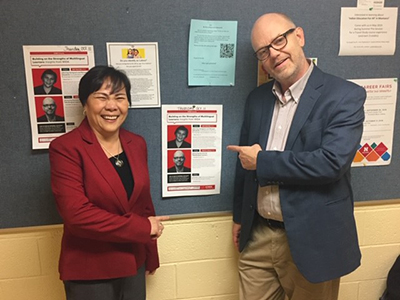Conversations with Tim: Creating a sense of belonging for immigrant and refugee students

By Tim Boals and Diep Nguyen
This month I asked Dr. Diep Nguyen, WIDA director of professional learning, to write about serving multilingual learners in these uncertain times. Here is her timely message for you:
Schools are opening for the new academic year – some virtually, some for in-person learning and others in a hybrid model. During this extraordinary pandemic year, immigrant and refugee families face exponential challenges that affect their wellbeing, and school openings offer unique challenges for these students and parents.
Do you know where your students are and how they are doing? These two questions are in the forefront of the minds of many of my friends who teach multilingual learners across the nation. As we prepare our classrooms to welcome students, we worry about reconnecting with those we know from last year and finding, identifying and welcoming new students who might need language assistance in the coming school year.
On May 30, NPR reported that Black and Brown communities are more negatively affected by the pandemic. For many immigrant and refugee families, current economic and health issues resulting from the COVID-19 pandemic intersect with their constant fear of authorities. This fear stems from existing anti-immigrant policies that have created often desperate situations, as families struggle to make ends meet.
Among our multilingual learners, immigrant and refugee students are the most vulnerable. The challenging social conditions faced by refugee and immigrant families directly affect the mental health of all members of the entire family unit, including school age children. In addition, many students are living within the isolation of their family unit since last spring when their education was disrupted. As schools reopen, many students look forward to seeing friends again. Others are fearful of the spread of the pandemic and are reluctant to go back to school.
This helpful article in Facing History can help teachers tend to students’ emotional health through classroom opening and closing routines, whether in a face-to-face setting or online. In times when our usual routines of opening schools are disrupted and the physical safety and curricular preparations seem overwhelming, these small routines might help focus on the emotional health of students on a daily basis. I encourage you to adapt and change these routines based on your local context and what you know about the home life of your students and their families. The more reflective these routines are to your students’ home lives, the safer and more welcoming they will feel in your class community.
Another valuable practice that I’ve found helpful is to hold class meetings once or twice a week. These class meetings are longer than the daily routines. Time is spent on having conversations with students about how to be a community together, how to be respectful, supportive and responsible for each other as friends and learning partners. Through these conversations, students learn to contribute and lead different aspects of your classroom life together. By engaging in these co-constructing conversations, students gain agency and a deep sense of belonging in your class.
As we head back to school, you may be busy preparing your curriculum map, setting learning goals, gathering materials, creating lesson plans for the first few weeks and making sure that everything is ready for students. For multilingual learners, your task at this time of the year may be to help register, screen and identify multilingual learners in need of language assistance services. WIDA, recognizing the need to screen students remotely, created a temporary solution – talk to your district test coordinator about using WIDA Remote Screener in your school (WIDA Secure Portal account required). I hope that you take advantage of this tool to expediently screen and identify students who are hard to reach.
In addition, to help you navigate some of these nuances of teaching during the pandemic, like tending to students’ emotional health, WIDA launched a new series of micro-offerings. Three courses can be accessed from the Distance Teaching and Learning webpage:
- Distance Learning with Multilingual Learners in Mind
- Tending to Multilingual Learners’ Social-Emotional Well-Being
- Consideration for Evaluating Online Resources for Multilingual Learners
Let us remember that before any language learning and academic achievement can be accomplished, immigrant and refugee students need a welcoming, safe community to belong to. You hold the key to this safe learning community for them. Given the extraordinary times we are living in, I want to thank you for your extraordinary commitment as educators and wish you and your students an extraordinarily successful school year.
About Conversations with Tim
Conversations with Tim, WIDA Founder and Director is a monthly WIDA news column. In each column, WIDA Founder and Director Tim Boals discusses the important innovation, research and collaboration taking place in the field of multilingual learner education. At times, Conversations with Tim may spotlight a colleague in the field and give voice to their work and perspective.





